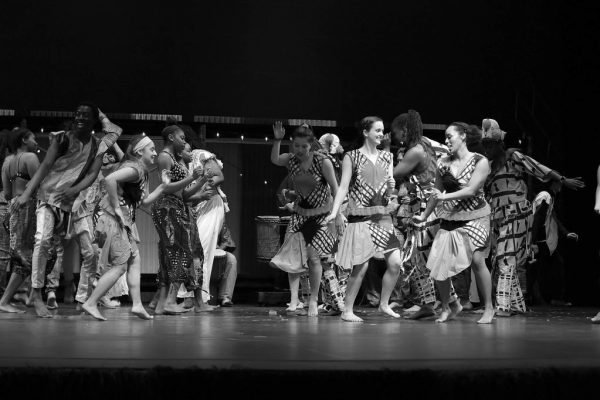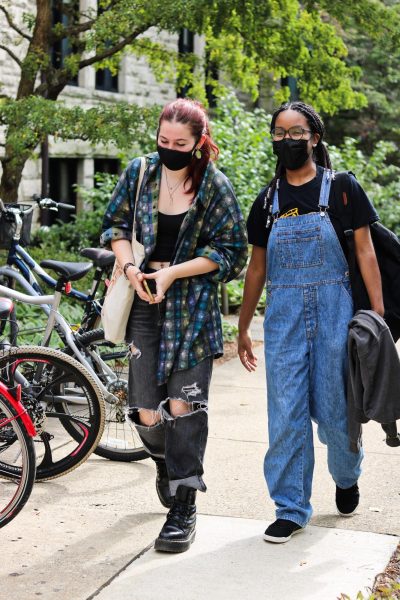It’s Time to Reevaluate Traditional Pedagogy
Picture this: you’re sitting in a King Building classroom on a dreary Thursday afternoon. Your professor has finally graded everyone’s midterms and leaves them on his desk for the class to pick up. People rush to grab their midterm, folding it up or holding it against their body on the way back to their desks to avoid the embarrassment of someone else seeing their grade. Your professor then lectures for an hour and fifteen minutes straight, waiting until the end of class to ask, “Does anyone have any questions?” The room goes silent, and the only sound comes from crickets chirping outside your classroom window.
This was an experience I had last week, and I am confident that many Oberlin students have experienced similar situations throughout their time here. This classroom, with an obsessive focus on grades and little chance for students to engage in discussion, emulates the prevalence of archaic educational standards. Oberlin is better than most colleges at challenging educational conventions, but there are still many academic disciplines where these standards remain uncontested. Despite the fact that Oberlin advertises itself as one of the best colleges in the world for fostering critical thinking, we continue to implement educational methods that are at odds with this identity.
Ironically, these educational methods teach us the opposite of what it takes to be independently successful. To be a successful individual, one has to embrace failure and learn from it, be willing to collaborate with others, and be willing to challenge authority when necessary. Yet traditional educational methods teach us the exact opposite. They limit collaboration, teach us to fear failure, and make us reluctant to challenge authority. By cementing these values in the minds of students, traditional educational methods teach us to be complacent cogs within the machine of society.
I’m sure many students are already aware that the current grading system teaches us to fear failure. Parents, educators, and mentors alike teach students from a young age that failure is unacceptable and that good grades are the only avenue toward a better future. This may be enough motivation for some students to succeed, but for many, the fear of failure creates an underlying anxiety that makes them reluctant to engage in the educational process. As a result, the process of deeper learning is neglected for the sake of regurgitating information on tests that will be useless to students in the future. Rather than focusing on the journey of learning, the current educational system strictly focuses on the destination.
The fear of failure and its resulting consequences are even more apparent at Oberlin, where practically every student performs at a high academic level. In this environment, pressure to succeed comes not only from authority figures but also from our peers. The pressure to be successful from our previous and current experiences makes many students act as if failure is not an option. Everyone is constantly working for the sake of the next A+, or the next internship, the next performance. When it seems like everyone around you is constantly succeeding, even a small failure can feel like a ton of bricks weighing down on you. How valuable is academic success when it comes at the cost of our mental health?
The limitations on collaboration within our education system further hinder our ability to become successful. In many classes, tests and assignments are expected to be done independently without consulting our classmates. According to the Honor Code, collaborating on an assignment intended to be done individually is a violation of academic integrity that can result in a number of academic sanctions, including suspension. Yet these rules embody the opposite of what is valued in most job sectors post-graduation. Many career paths require near-constant collaboration in order to become successful. Businessmen, journalists, and scientists alike work in close teams. Being able to work within groups and interact productively with others is an invaluable skill in any career field.
While I still think there should be room for independent thought in academia, increased collaboration would greatly benefit students. Collaboration exposes us to different thought processes and prepares us for working with others in the future.
Traditional educational methods also instill a reluctance to challenge authority in the minds of students. Even subtle factors like the positioning of desks make it clear which classes create a power dynamic that limits the educational process and which classes do not. In traditional classroom settings, everyone sits at their desk facing the front of the class. The professor is the only one standing and calls upon people as they please. When students ask questions, the answers are often brief and there is no room for the student to respond to the professor’s answer. Additionally, challenging the professor’s method is considered a huge faux pas in these types of classes. Deeper discussions are also limited.
In classes where critical thinking is encouraged, desks are arranged in a circle. The professor sits with the rest of the class to engage in discussions and only stands when it is absolutely necessary. Additionally, with this arrangement students can critically engage with the material and are encouraged to challenge conventions. In these types of classes, there is a significant difference in the learning that occurs. Students ask and answer questions and are able to converse with their professors on an equal level. Discussion is encouraged, and it is conversational in nature. I’ve found that many students, myself included, learn better in these educational settings.
Based on my own experiences, I believe that most students learn on a deeper level when they take classes that reject traditional educational methods. So the question becomes, “Why do we still embrace traditional educational methods in the first place?” It makes no sense to continuously implement antiquated educational standards when these standards teach us to fear failure, reject collaboration, and refuse to challenge authority. Faculty should teach students to embrace failure and collaboration while fostering a healthy willingness to challenge authority. Schools across the country and around the world should take a long, hard look at their educational methods and what they can do to improve them. If they do not reevaluate traditional methods, our education system will continue to breed complacency and limit the capabilities of students.




